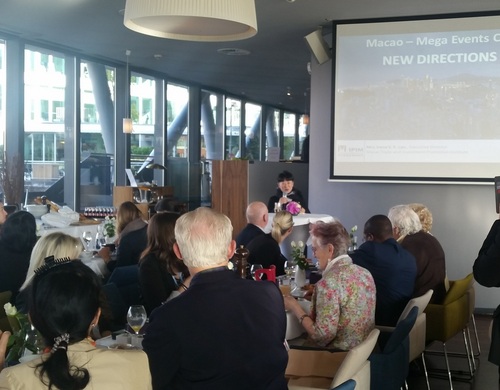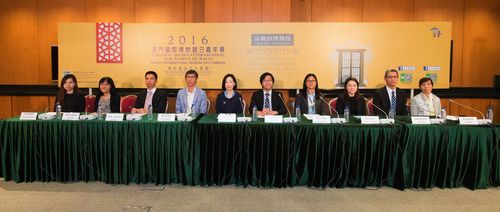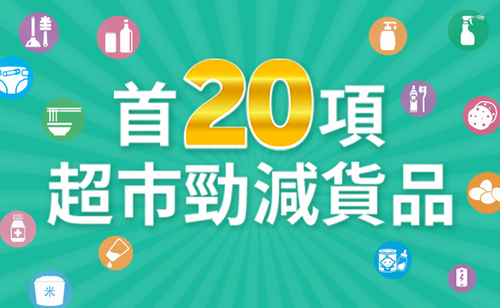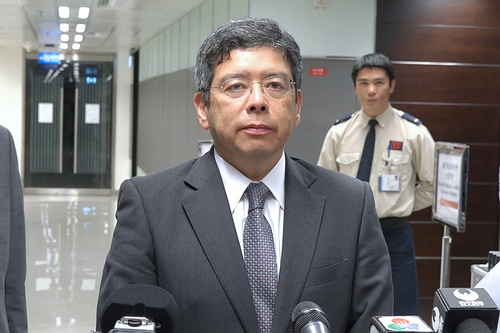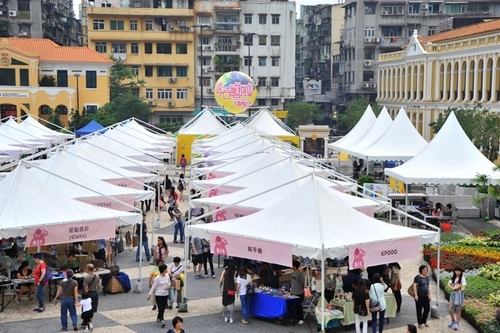Macao SAR Government Portal
News
Consumer Council released its latest ‘Supermarket price survey’ in Sé Parish
Consumer Council conducted its latest ‘Supermarket price survey’ in April on 21 April for the implementation of Section 2b), Article 10, Law 4/95/M of 12 June. Surveyed locations included 12 supermarkets in Sé Parish. The latest ‘Supermarket Price Survey’ is now available on Consumer Council’s website (www.consumer.gov.mo), ‘Supermarket Price Information Platform’ iPhone and Android apps, and on the Council’s WeChat account page. The survey is also available free of charge at the offices of Consumer Council, IACM’s Iao Hon and S. Domingos Markets, bookstores and libraries. Consumers may also access the resources through WAP channels on their mobile phones. With reference to the local seven parishes and the number of supermarkets in each parish, the Council has divided around 100 supermarkets into 8 areas for price collection. The Council collects prices from these supermarkets for the provision of a more comprehensive database for consumers to check price discrepancies and make price comparisons according to their desired locations. For inquiry, please call 8988 9315.
…
Macao Orchestra joins hands with Sayaka Shoji to present Shakespeare’s World Concert
Lü Jia, Music Director and Principal Conductor of Macao Orchestra of the Cultural Affairs Bureau, will collaborate with Japanese violinist Sayaka Shoji in the concert Shakespeare’s World –Lü Jia and Sayaka next Friday, 29 April, at 8pm, at the Macao Tower Auditorium, presenting Sergei Prokofiev’s Violin Concerto No. 2. Tickets are now available through the Macau Ticketing Network. In Gramophone Magazine, Sayaka Shoji is described as “a formidable musician, able to draw on huge reserves of stamina and the unflinching equal of anything thrown at her”. She took the First Prize of the 1999 Paganini Competition at the age of 16, and was the first Japanese musician and the youngest winner of this prize. She is also one of the most internationally renowned violin sensations, she has performed with a number of leading orchestras throughout the world, including the BBC Philharmonic, Wiener Symphoniker, Danish National Symphony Orchestra, and NHK Symphony Orchestra, among others. In January 2016, Sayaka Shoji received the prestigious Mainichi Art Award. In this concert, Sayaka Shoji will have the debut performance with the Macao Orchestra to perform Prokofiev’s Violin Concerto No. 2, which was created at the same period with Prokofiev’s well-known ballet Romeo and Juliet, a namesake adaptation from Shakespeare’s drama. This concerto mirrors the adaptation in numerous passages. The programme of the concert also features with Berlioz’s King Lear Overture, based on an adaptation from Shakespeare's King Lear, using musical instruments like double bass and obes to play out the tragedy of main character. The concert concludes with Schumann’s Symphony No. 4, which was dedicated to Schumann’s wife Clara as a birthday present. This piece of work can be regarded as a perfect demonstration of romanticism. Tickets for Shakespeare’s World – Lü Jia and Sayaka are priced at MOP200, MOP150 and MOP100, with various discount plans available. Ticketing hotline: 2855 5555. For more details and programme enquiries, please visit the Orchestra webpage at www.icm.gov.mo/om or contact OM through tel no. 2853 0782 during office hours.
…
Macao Art Museum presents printmaking by Catherine Cheong Cheng Wa and shares her creative concept
The Macao Museum of Art (MAM), under the Cultural Affairs Bureau, has launched the “Macao Arts Window” since 2012, which aims to encourage creativity and develop the contemporary arts in Macao. The theme of this edition of the “Macao Arts Window” is the exhibition “Encounter – Printmaking by Catherine, Cheong Cheng Wa”, the vernissage was held on Thursday, 21 April, at 6:30pm, on the third floor of MAM. The artist gave a finishing touch to her works by varnishing them. The “Macao Arts Window” aims to provide an open and diverse exhibition spaces and exchange platform, and encourage local artists to explore and express concepts and forms of contemporary art. Catherine, Cheong Cheng Wa obtained a degree in Graphic Design at the Macao Polytechnic Institute in 2003 and then went to France to further her studies. In 2008, she graduated in Visual Arts, specialised in video installations, from the School of Art and Design, Toulon Provence Mediterranean, (l’ésadtpm), in France. Following her return to Macau, she actively participated in different types of art exhibitions. As specialized in printmaking, she has participated in “Macao Stories 2 – Love in the City” and other films as artistic director in film as well as supporting in the organization of art exhibitions. In 2015, she won the first prize in the international competition “The 2nd Macao Printmaking Triennial” with her work “Macao People”. Printmaking in this exhibition portrays the artist’s experiences and perceptions during her four-year stay in France: landlords, tenants and their homes; friends from all over the world, work colleagues, classmates and teachers of languages and arts schools, etc. Through the exchange with friends from different culture, background and customs, the artist realizes that friendship is without language barriers and learns about herself more deeply through the process of perception of human nature, of experiencing good and evil, of building personal values and of attitude towards life. Through her printmaking and engraving works, the artist tries to describe each person whom she met in a kind of portrait where she adds elements which are significant and valuable to herself or themselves, illustrating the story between those people and the artist. The exhibition “Encounter – Printmaking by Catherine, Cheong Cheng Wa” is open until 5 June at the Macao Museum of Art, located in NAPE, Avenida Xian Xing Hai, and is open daily from 10am to 7pm (no admittance after 6:30pm; closed on Mondays). Admission fee is MOP5 and is free on Sundays and public holidays. For enquiries, please call the MAM through tel. 8791 9814 during office hours, or visit the MAM’s webpage at www.MAM.gov.mo.
…
IPIM organised Macao´s convention, exhibition and tourism sectors to participate in IMEX 2016 in Frankfurt, a major event for the convention and exhibition industry
IMEX 2016 in Frankfurt was held at the Messe Frankfurt Convention Centre, from 19 to 21 April in Frankfurt. This year´s IMEX was the largest since its inception in 2003, having attracted 3,500 participants from 150 countries and regions around the world. “Macao - Mega Events City” is blooming During the “Macao breakfast to Promote the Advantages of Macao´s Conventions and Exhibitions” held during IMEX, Executive Director of Macao Trade and Investment Promotion Institute (IPIM), Mrs. Irene V. K. Lau, gave a presentation to convention organisers, international business associations and destination managers from around the world and promoted the advantages of holding conventions and exhibitions in Macao as well as the anticipated opportunities for the industry. Mrs. Lau said that over the next two years, more hotel, convention and exhibition projects will be completed in the city, coupled with the completion of major infrastructure projects in the neighbouring areas, such as the Hong Kong-Zhuhai-Macao Bridge, will help to promote the regional integration of the MICE industry, thus allowing Macao to welcome more international convention and exhibition trade visitors, and bring about new openings for the local MICE industry. Networking session participated in by over 50 potential buyers and MICE industry representatives IPIM set up a “Macao Pavilion” covering 96 square metres and organised a networking session which attracted more than 50 potential buyers and Europe’s MICE industry representatives. Apart from introducing the advantages of Macao´s conventions and exhibitions during the event, Macanese specialties, such the “pasteis de nata” (Portuguese egg tarts) were also served at the venue, so that the participants could experience the characteristics of the Sino-Portuguese cultural integration, with the aim of strengthening co-operation and exchanges between Macao´s MICE industry operators and their counterparts abroad. IPIM joins hand with MICE industry to promote Macao’s strengths in the industry The “Macao Pavilion”, using the theme “Macao – Mega Events City”, also set up a promotional counter to advertise the services offered by IPIM as well as to answer enquiries. Subsequent to the steady development of Macao´s convention and exhibition industry, there is a need for local MICE operators to promote their business. In addition to IPIM and Macao Government Tourism Office (MGTO), there were 13 exhibitors coming from different sectors, namely, hotels, travel agencies, professional conference organisers, destination management, and conference service providers. IPIM will work with local MICE operators to promote the advantages of holding conventions and exhibitions in Macao, and promote Macao as the “Mega Events City”, in order to attract a greater number of international conventions and exhibitions to select Macao as venue for their activities. Extensive business opportunities and potentials in the conference and exhibition business During the 3-day event, over 350 business matching sessions were held at the “Macao Pavilion “which received favourable responses. Furthermore, more sessions were held than in previous years, reflecting that Macao is now a popular destination for international MICE events. Through the business matching sessions, exhibitors were able to explore business opportunities and encourage more international MICE events to select Macao as their venue.
…
2016 Macao International Museum Day Festival opens in May revealing museums and cultural landscapes
In response to this year’s International Museum Day, 18 Macao museums co-organize the “2016 Macao International Museum Day Festival” themed “Mobile Museum – The Blending of Chinese and Western Cultures in Macao”. The opening ceremony will be held on 8 May, Sunday, at 3pm, at the Calçada da Igreja de S. Lázaro. Representatives of cultural entities from Guangdong Province and of the Hong Kong Home Affairs Bureau and its respective museums will be invited to kick off a series of activities. The general public is welcome to attend the ceremony. The press conference of “2016 International Museum Day Festival” was held on 21 April, at the Macao Science Center and was attended by representatives of museums including the Representative of the Heritage Exhibition of a Traditional Pawnshop Business, The Taipa Houses-Museum, Museum of Taipa and Coloane History and Macao Tea Culture House: Head of the Department of Museums of the Cultural Affairs Bureau, Lei Lai Kio; the Director of the Macao Museum of Art, Chan Hou Seng; the Director of the Macao Museum, Loi Chi Pang; the Representative of the Fire Services Museum: 1st Class Chief, Sam Ka Hou; the Representative of the Natural and Agrarian Museum: Head of the Division of Nature Conservation and Studies of the Civic and Municipal Affairs Bureau, Fanny Chen; the Chief Curator of the Communications Museum of Macao, Olivia Wong; the Representative of the Grand Prix Museum and Wine Museum: Head of the Division of the Facilities Management of the Macao Government Tourism Office, Lei Wan Wai; the Director of the Tung Sin Tong Historical Archive Exhibition Hall, Lei Keng Lam; the Deputy Curator of the Macao Science Center, Sylvester Cheong Hung Fat, and the Director of the Maritime Museum, Chan I Un. The theme of the 2016 Museum International Day is the “Museums and Cultural Landscapes”. In consonance with this theme and in order to present the unique landscapes resulting from the collaboration and fusion of the Chinese and Western cultures in Macao, this edition of the “Macao International Museum Day Festival” will be held at the Bairro de S. Lázaro as a starting point, bringing the surrounding areas, historical buildings and cultural atmosphere together into an emblematic area of “Mobile Museum”, where a series of excellent activities will be organized during the month of May. These activities comprise fusion elements of the Chinese and Western cultures, such as religion, architecture, art, music, stamps, food and lifestyles, among others, including thematic exhibitions, workshops, lectures, guided tours and a street carnival, which aim to promote close by the residents and tourists the valuable cultural resources of Macao’s museums. The thematic exhibitions integrated in these activities include several themes such as Macao’s historical architecture, works submitted to the Photography Contest of “The Blending of Chinese and Western Cultures in Macao”, art and history, among others. On the inauguration day, there will be a great variety of dynamic activities such as workshops of clay modelling, tea sets design, street signs painting, caricature drawing, seals engraving, herb gardening and magnetic tiles, among others; lectures on the unique architecture and the history of the Chinese and Western cultures in Macao; as well as T-shirts with thematic prints, wine tasting, etc. This year’s 2016 Macao International Museum Day is jointly organized by the Natural and Agrarian Museum, the Grand Prix Museum, the Museum of the Holy House of Mercy, the Tung Sing Tong Historical Archive Exhibition Hall, the Heritage Exhibition of a Traditional Pawnshop Business, the Fire Services Museum, the Maritime Museum, the Communications Museum, the Museum of Taipa and Coloane History, the Handover Gifts Museum of Macao, the Lin Zexu Memorial Museum of Macao, the Macao Science Center, the Macao Tea Culture House, the Dr. Sun Yat- sen Memorial House in Macao, the Macao Museum, the Macao Museum of Art, the Wine Museum and the Taipa-Houses Museum; and is supported by Diocese de Macau, Albergue da Santa Casa da Misericórdia, Creative Industries Promotion Association of St. Lazarus Church District, 10 Fantasia and Tai Fung Tong Art House. In May, each museum will organize other celebrations, exhibitions, workshops, lectures and free admission days. For more information, please visit the Macao Museum’s webpage at www.museums.gov.mo, or follow the Cultural Affairs Bureau or the Macao Government Tourism Office’s WeChat accounts or call through tel no. 8394 1217 during office hours.
…
Government fully understands concerns of Pearl Horizon homebuyers
The Government strives to protect the rights of those who bought units in Pearl Horizon, and the Government has been paying close attention to the rights and demands of the buyers of the unfinished private housing project. The Government has recently received a request for assistance from buyers of units in the scheme. The Government fully understands their demands and the difficulties they face following a decision to recover the land from Pearl Horizon due to the leaseholder failing to fulfil the land concession agreement. The Government notes however that the case of Pearl Horizon has pending legal proceedings. The Government will be able to propose a solution only when the court has made a decision in relation to those proceedings. The Government pledges to protect the rights of buyers according to the law, notwithstanding the court’s ruling.
…
Consumer Council added ‘Top 20 products with biggest price drop’ function to its supermarket price app
O Posto das Informações de Preços dos Produtos à Venda nos Supermercados do Conselho de Consumidores passou a ter uma nova função, com a qual os consumidores podem verificar os primeiros 20 produtos cujo preço regista a descida mais expressiva e ainda a diferenciação de preços dos mesmos entre os supermercados locais. Nova função para verificar os preços mais alto e baixo, a diferenciação de preços e a descida de preço O CC tem realizado uma investigação mensal sobre o preço dos 350 produtos vendidos em mais de centena de supermercados em Macau. Com vista a permitir ao consumidor verificar com maior facilidade quais supermercados vendem produtos a um preço mais reduzido, o CC tem optimizado as funções do Posto das Informações, que, na última actualização, passou a dispor da função de pesquisar os primeiros 20 produtos que registam a maior descida de preço respectivamente em 8 zonas da cidade divididas por parte do CC. Além disso, ainda se podem encontrar informações como os preços mais elevado e mais baixo destes produtos, a taxa de descida de preço e a respectiva diferenciação de preços entre os supermercados. Nova função ajuda os consumidores a comprar os produtos ao preço mais baixo Com a nova função, os consumidores podem ir ao supermercado que vende produtos a um preço mais baixo, bem como verificar se estes são realmente baratos apesar de que estão em saldos ou o preço foi reduzido. O CC revela que esta função pode contribuir para analisar a mudança de preços nos supermercados e ainda as práticas comerciais das cadeias de supermercados, para além de ajudar o CC a definir as políticas na área de protecção dos direitos e interesses dos consumidores. Posto das Informações entra em várias plataformas electrónicas Agora os consumidores podem aceder ao Posto das Informações no website do CC, descarregar a aplicação informática do mesmo (com versões disponíveis respectivamente para iPhone e para Android) ou visitar a conta de Wechat do CC para recorrer à função de pesquisar os primeiros 20 produtos que registam a maior descida de preço. Além disso, ainda podem obter a lista dos mesmos, em papel, nos 16 centros de serviços sociais e bibliotecas. Por outro lado, o CC reforçou os trabalhos de investigação sobre o preço da carne suína fresca no início do ano corrente, sendo o relatório mensal da mesma disponibilizado em todas as plataformas referidas. Os consumidores são encorajados a consultar os relatórios de investigação sobre o preço dos produtos lançados pelo CC, por forma a comprar, com maior facilidade, os produtos de primeira necessidade a um preço mais razoável. Telefone do CC para qualquer esclarecimento: 89889315.
…
Government adheres to Land Law regarding ‘idle plots’
The Government adheres to the provisions of the Land Law when handling issues related to “idle plots” of undeveloped land, stressed the Secretary for Transport and Public Works, Mr Raimundo do Rosário. Mr Rosário made the comments on Wednesday (20 April) after a meeting of the Urban Planning Committee. The Government would initiate procedures to nullify a land concession in cases where leaseholders failed to develop the land according to the timetable and terms stated by the Government, he said. The term length of a Government land concession is generally 25 years. But such a concession can be nullified prior to that expiry date if the concession holder breaches conditions stated in the agreement, said the Secretary. The specifics of such conditions vary from concession to concession, but typically include milestones such as a deadline for submission to the Government of a development plan. Information relating to Government decisions on land concessions is publicly available in the Macao SAR Gazette, Mr Rosário stated.
…
CE to attend Legislative Assembly meeting tomorrow
The Chief Executive, Mr Chui Sai On, will attend a plenary session of the Legislative Assembly tomorrow (22 April) and answer legislators’ questions on Government policy and social issues. The session will start at 3pm and will be broadcast live on television and radio channels of public broadcaster Teledifusão de Macau (TDM). Members of the public also have the option of watching the proceedings online via: the website of the Legislative Assembly (http://www.al.gov.mo); the Macao SAR Government Portal (http://www.gov.mo); the website of the Office of the Chief Executive (http://www.gce.gov.mo); the website of the Government Information Bureau (http://www.gcs.gov.mo); the official channel for Macao Government news on YouTube (www.youtube.com/macaogcs); and Government apps for mobile devices. The Chief Executive pays great attention to communication with the Legislative Assembly. Besides attending plenary sessions of the Assembly in November every year in order to deliver the Policy Address relating to the following fiscal year, the Chief Executive also attends similar sessions in April and August each year. This is in order to update the public with the progress of Government work; to enhance communication with legislators; and to optimise administrative transparency.
…
“Tap Siac Craft Market” Stall Registration is now open
Organised by the Cultural Affairs Bureau (IC) and co-organised by the Civic and Municipal Affairs Bureau, this year’s “Tap Siac Craft Market” will be held from 27 May 2016 for two consecutive weekends (Friday to Sunday) at Tap Seac Square. In conjunction with the Macao International Dragon Boat Races, the Craft Market will be held on 4, 5 and 9 June at Nam Van Lake Square. Craft Market stall registration is now open and all cultural and creative entities and individuals are invited to register, in order to showcase and sell their original brands and products. The registration deadline is 1pm, 30 April 2016. This year’s “Tap Siac Craft Market” will be held from 27 to 29 May and from 3 to 5 June (Friday to Sunday), from 5pm to 10pm at Tap Seac Square, featuring a total of 200 stalls and 30 performances. In addition to local cultural and creative practitioners, IC will also invite participants from Hong Kong, Taiwan and Malaysia, amongst others. Furthermore, to capture the synergy of the “2016 Macao International Dragon Boat Races” and promote festivals with local features, the Craft Market will be extended to the Nam Van Lake Square from 4 to 5 June and on 9 June (Dragon Boat Festival), from 12pm to 7pm, coinciding with the Dragon Boat Races, featuring a total of 30 stalls and 18 shows. Inaugurated in 2008, the “Tap Siac Craft Market” is Macao’s first large-scale integrated platform for the display and sale of cultural and creative products, while also featuring original music performances. Every year the event attracts participators from Macao, Hong Kong, Taiwan and Southeast Asia and has been highly appreciated by both residents and tourists since its inception. For details, please visit the Tap Siac Craft Market page on Facebook (www.facebook.com/TapSeac.Artfair). Applicants must be Macao residents, registration is free and can be made on behalf of a group or individually; IC will select stall operators considering the originality and peculiarity of their products. Application forms are now available at the Department for the Promotion of Cultural and Creative Industries of the Cultural Affairs Bureau (No. 567, Avenida da Praia Grande, BNU Building, 12th floor A-D, Macao) or can be downloaded from IC’s website (www.icm.gov.mo) and the Macao Cultural and Creative Industries Website (www.macaucci.com). Applicants must submit all required documents together with the completed application form to the Department for the Promotion of Cultural and Creative Industries during the specific period of time stated in the Application Form. For enquiries, please contact Ms. Wong, staff of IC, through tel. no. (853) 2892 4040 during office hours.
…



